Israel-Gaza: Locals scramble for cover, some hiding in wardrobes
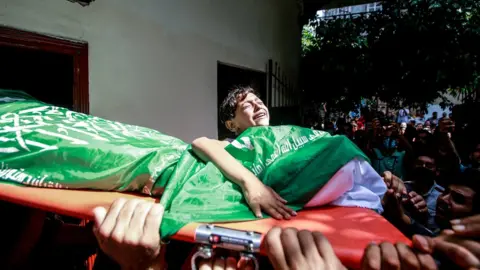 Getty Images
Getty ImagesResidents in Israel and Gaza say they are bracing themselves for a drawn-out conflict, as Palestinian militants and Israeli forces continue to exchange fire.
Militants have fired hundreds of rockets towards Israel since Monday night, and Israel has responded by hitting targets in Gaza.
The violence is the worst in years and has caused casualties on both sides.
The BBC has been talking to residents about their fears.

Bracing for a long exchange of fire
Yolande Knell, Middle East correspondent, Jerusalem
The southern Israeli city of Ashkelon has borne the brunt of the latest heavy barrages of Gaza rockets.
The Hamas militant wing warned it would make life "hell" here and that is how it has seemed for locals.
The constant wail of warning sirens sends them scrambling for cover.
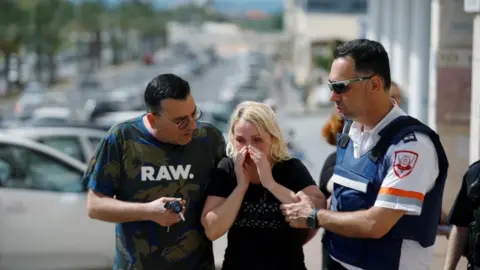 Reuters
ReutersOverhead, there are loud bangs and trails of white smoke across the blue sky as Israel's Iron Dome missile defence system intercepts most of the launches from nearby Gaza.
However, a number of buildings have been directly hit. Two women were killed. Dozens of people have been rushed to hospital for treatment.
Many of the older buildings here do not have the bomb shelters that now come as standard in Israel.
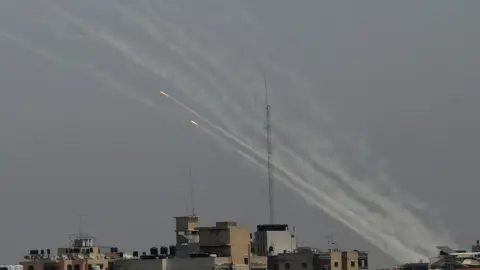 Getty Images
Getty ImagesOne woman spoke of the terrifying moment before dawn when a missile hit her home as she hid in her wardrobe.
Many here are bracing themselves for the heavy exchange of fire to continue for days.
"It will go far, this round of violence," says one man, Yossi Asulin. "Now that there are people killed, people here want to solve the problem [with Hamas] once and for all."

'It happened so quickly'
In the Israeli city of Lod, which is currently under a state of emergency, an Israeli Arab man, 52, and his 16-year-old daughter died when rocket fire hit their car, also injuring the teenager's mother.
"I was at home, we heard the noise of the rocket. It happened so quickly. Even if we had wanted to run somewhere, we don't have a safe room," Ahmad Ismail, the girl's cousin, told public broadcaster Kan.
As air raid sirens sounded throughout the night, thousands of people slept in bomb shelters, including Anna Ahronheim, the defence and security correspondent of the Jerusalem Post, and her five-month-old baby.
"To hear hundreds of interceptions and even to hear rockets fall near us was horrifying," she told the BBC.
An Israeli woman in the coastal city of Ashkelon said on Channel 11 television: "The children have escaped the coronavirus, and now a new trauma."
But Adam Mallerman, a British-born man from Jerusalem, told BBC OS on World Service Radio that while there are "cycles of violence... there is an acceptance that this is the price for building this incredible little country of ours".
"We have neighbours like Hezbollah and Hamas who would like to see us removed genocidally," he said. "There is almost nobody here, certainly born here, who doesn't know people or hasn't lost people in either the wars over the last 75 years or acts of terrorism."
'Everything around us caught fire'
In Gaza, smoke is still rising into the air and the streets are full of rubble. Palestinians are assessing the damage after a night of violence.
One family in northern Gaza has lost five members who were killed by an Israeli air strike, including two young brothers who were filling sacks of straw at the time.
"We were laughing and having fun when suddenly they began to bomb us. Everything around us caught fire," their 14-year-old cousin, Ibrahim, told AFP news agency, breaking down in tears as he described their death.
Another air strike hit a car carrying three civilians, who were all killed.
Donia Amer, who also lives in Gaza, told BBC OS that she and her family had woken to "hundreds of explosive sounds" at the same time - what she called "30 minutes of madness".
"We can never forget this moment," she said. "We can never forget our children's fear, nor ours."
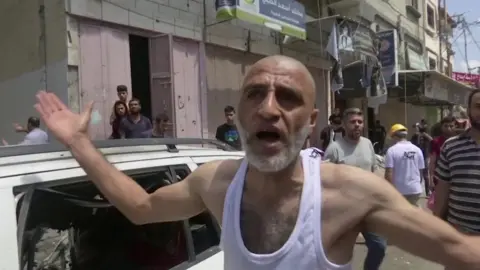 Reuters
Reuters"What should I say? This is a crime,"Gaza resident Abed Aldayah, 54, told Reuters news agency.
"They were civilians: a woman, her children, a barber and a shop owner. These are the people who were at the scene. They didn't hit a militant nor an official, we are civilians sleeping at our homes."

No option but to hide at home
Rushdi Abu Alouf, BBC News, Gaza City
Gaza has not experienced a situation like this for years. This miserable, overcrowded city knows very well what war means.
The main commercial street in the city centre is almost empty except for a few shoppers. Most shops were closed ahead of Eid al Fitr - the most important religious and social occasion for Muslims.
Bombardments did not abate as the sound of Palestinian rockets and Israeli air strikes echoed across the region on Tuesday morning.
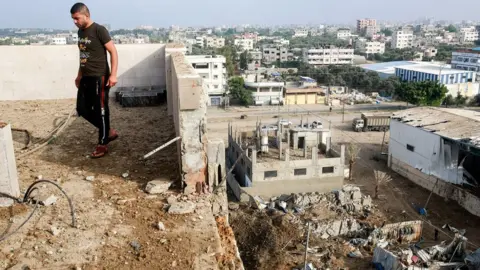 Getty Images
Getty ImagesA few metres away from our office in Gaza, a loud explosion rang out and huge black smoke billowed into the sky after an Israeli air strike hit an apartment building housing hundreds of residents. The raid killed two Islamic Jihad military leaders hiding inside.
"This is Israeli terrorism, we are innocent civilians. My children are terrified, they do not want to go home again for fear of renewed air strikes," says one woman - screaming and carrying her young child as she escapes from the building.
Since the round of fighting began, residents have rushed to their homes to flee the bombing. Gaza has no shelters or air raid sirens, so residents have no other options but to hide in their homes.
"We do not know for how long this round of fighting will continue. It seems that the escalation is continuing," says local resident Sherin Emadadein. "I'm a mother of four children, we live in an apartment in a seven-floor building. There is no basement in our building, I do not know where we will flee if our building is bombed."
Sherin spoke to me on the telephone as she bought food from the only food shop open in her west Gaza neighbourhood.
"I was supposed to buy chocolate and sweets to celebrate the end of the long fasting month of Ramadan, but now we don't know for how long this escalation will last so I only buy the basic needs," she adds.
